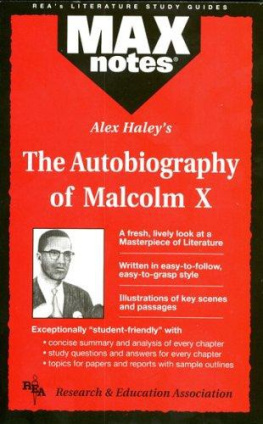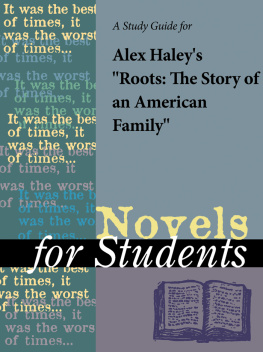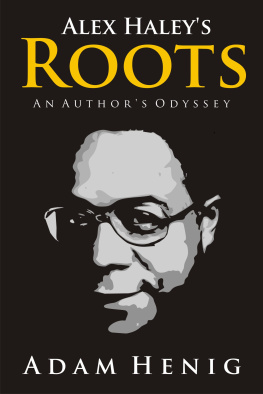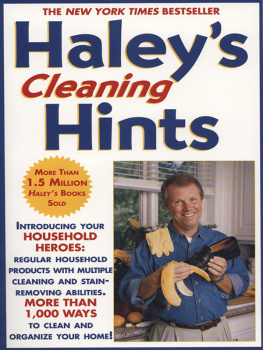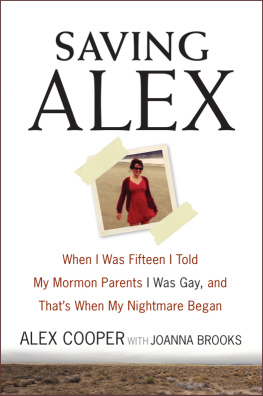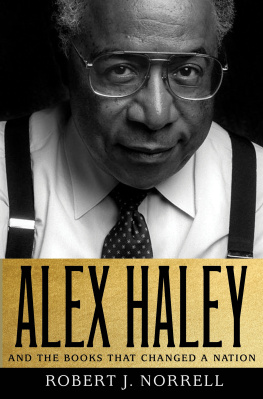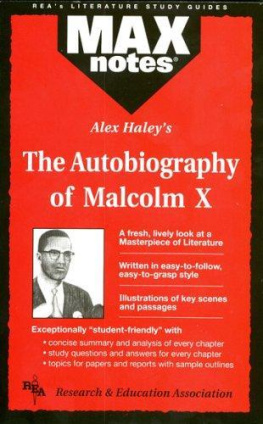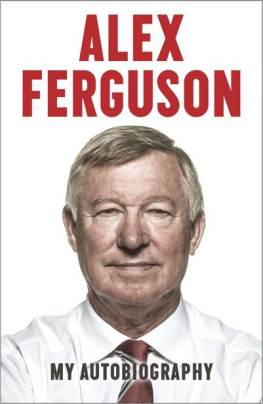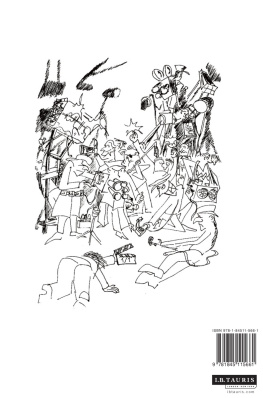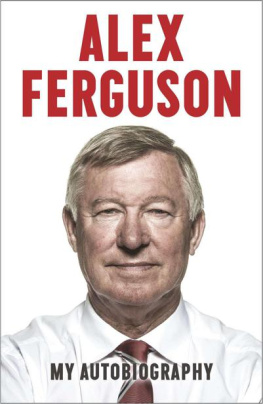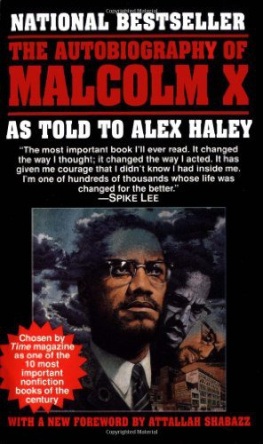M Autobiography of Malcom XBehold, America. Just when our country's cultural evolution appears to have the man who was the author of the internationally acclaimed _Roots_ passed away suddenly in the middle of the night. Alex Haley and I had discussed the possibility of my writing his autobiography to acknowledge our literary circle, our family of writers-my father to him and him to me.Six years have passed since I received this initial request to prepare a new foreword for my father's life story. My godfather's wish was that I commemorate my father's life by writing about some of the significant events that have served as a postscript for his extraordinary life story, but to do this it is essential to begin with the legacy that my father himself was heir to from the beginning.In 1919, my paternal grandparents, Earl and Louisa Little, married and began their large family of eight children. At the same time they both worked steadfastly as crusaders for Marcus Garvey's Universal Negro Improvement Association, acting as chapter president and writer/translator for more than a decade. Their children were deeply involved and inspired by their parents' mission to encourage self-reliance and uphold a sense of empowerment for people of the African Diaspora.Given the turbulence, fear, and despair of the depression era, with its economic droughts and racial and social inequities, my grandparents could never have imagined that one of their own children would have his likeness on a United States postal stamp before the century's end.Eighty years later, on January 20,1999, pride filled Harlem's historic Apollo Theatre as six of Earl and Louisa Little's granddaughters sat encircled by a body of fifteen hundred, as family, friends, esteemed guests, and well-wishers gathered to celebrate a momentous occasion-the unveiling of the United States Postal Service's newest release in its Black Heritage Stamp Series.The issuance of the stamp with the image of El-Hajj Malik El-Shabazz-known to the world as Malcolm X and fondly loved by myself and my five sisters as Daddy-will provide a source of eternal pride to his children. While this was indeed a glorious moment, it does not cancel the painof the loss of both our parents, or even kiss away the ache of their absence. What it certainly does is add to the blessings of our dowry.The stamp also serves as a reminder of the stock from which we were born and confirms significantly that how one lives his or her life today stands as a testament to one's forever after.In his genuine humility and pure dedication to service, my father had no idea of the potency of his deeds, of the impact his life would have on others, or of the legacy that was to unfold. As he and my godfather, Alex Haley, worked diligently to complete this classic work-in person, from airport telephones, via ship to shore, or over foreign wire services-he could never have imagined by America's tone in his final days that his words, philosophy, and wisdom would be so appreciated and honored around the world, or that it would still offer inspiration and guidance to so many.In my father's absence, my mother nurtured and protected the significance and value of her husband's endless devotion to human rights. She was thrilled by the opening discussions about her husband's image appearing on a U.S. postal stamp. From her perspective, it was not as inconceivable as others have found it. To my mother, it was his due.As the house lights dimmed in the Apollo Theatre, the flickering images of black-and-white photographs and film clips on the screen chronicled my father's life. Bittersweet, his youthful face and broad smile caressed my heart. As the documentary film moved forward, the voice-over of our dear family friend and loving uncle actor Ossie Davis delivered the eulogy from my father's funeral in 1965. This became the backdrop for the montage of nostalgicchildhood memories that played in my mind. Life with both parents and my little sisters. Life joyous and uninterrupted.When people ask how my mother managed to keep my father's memory alive, all I can say is-for my mother, he never left. He never left her. He never left us. My father's spiritual presence is what sustained my mother. And we, their children, were the beneficiaries of their timeless love for one another.Born and raised in a family that was culturally varied, I innately gravitated to the rhythms of the world. Mommie was our constant, as many mothers are. Daddy was the jubilant energy in our world. He was not at all like the descriptions I grew up hearing. In addition to being determined, focused, honest, he was also greatly humorous, delightful, and boy-like, while at the same time a strong, firm male presence in a house filled with little women. His women. My sisters, me, and our mother. A collaboration of qualities that enchants me even now.... If you knew him you would know why we must honor him, Uncle Ossie's voice continued. Malcolm was our manhood, our living, black manhood.... and, in honoring him, we honor the best in ourselves....A spotlight on the Apollo podium brought me back to the present as the announcer introduced Ruby Dee and Ossie Davis, the first of an intimate selection of my father's esteemed comrades and appreciators from the front line to speak and share their remembrances.Aunt Ruby opened, What a privilege to witness the radical gone respectable in our times.... Uncle Ossie continued, We in this community look upon this commemorative stamp finally as America's stamp of approval....When I had mentioned the issuance of the stamp to others, the news simply stopped folks in their tracks. Touched. Teary-eyed. They could hardly believe it. They had to catch their breath, or ask me to repeat myself. How can this be? they wondered. A stamp with Brother Malcolm's face on it? What does it mean? Is America really ready for a Malcolm X stamp, even if it is thirty-four years after his assassination?I reflected on the message of Congressman Chaka Fattah, the ranking Democrat on the Postalsubcommittee, who commented, "There is no more appropriate honor than this stamp because Malcolm X sent all of us a message through his life and his life's work.Stamps are affixed to envelopes that contain messages, and when we receive an envelope with this particular stamp on it hopefully it is a message that will speak again to the conscience of this nation. Hopefully not just to those of African descent in America but to those who want to speak and be heard on the question of human rights throughout the world. To this day Malcolm X stands as a leader. His thoughts, his ideas, his conviction, and his courage provide an inspiration even now to new generations that come.I've asked myself, What change in our society today permits the reevaluation of my father's convictions or his stance on the human injustices that plagued the international landscape? For years, he's been the subject of a patchwork of commentaries, numerous judgments, and endless character assessments from a spectrum of self-appointed experts. But, in spite of the psychoanalysis, Malcolm will always be exactly who he is, whether or not we as a society ever succeed in figuring him out. Truth does not change, only our awareness of it.Not everyone agreed with my father's philosophy or methodology; he was considered complicated, intricate, and complex. Nevertheless, he was always a focused man with a commitment and a program. His plan of action, regardless of the stages of his life, his agenda, and his perspective were always poignantly clear.Malcolm X never advocated violence. He was an advocate of cultural and social reconstruction- until a balance of equality was shared, by any means necessary. Generally, this phrase of his was misused, even by those who were his supporters. But the statement was intended to encourage a paralyzed constituent of American culture to consider the range of options to which they were entitled-the means. By any means necessary meant examine the obstacles, determine the vision, find the resolve, and explore the alternatives toward dissolving the obstacles. Anyone truly familiar with my father's ideology, autobiography, and speeches sincerely understands the significance of the now-famous phrase.My father affected Americans-black and white-in untold measure and not always in ways as definitive as census charts and polls have dictated. We've misrepresented the silent majority on both sides. There were black folks who carried as much disdain for my father as some white folks did, and then there were some white folks for whom his life's lessons were as valuable a blueprint for personal and spiritual development as they have been for many black folks. Nevertheless, within the range of the boisterous and the silent there are still folks brown, red, and yellow on this continent and elsewhere who honor and respect the true message of Malcolm X Shabazz.Fortunately, as a child, my surroundings were filled with my father's partners for social change. This warm, devoted circle of people was always on the front lines of the struggle, working to ensure the rightful equilibrium of human rights-not just domestically, but globally-by any means necessary. Whether they were persons of note or simply hardworking citizens, these individuals in my early life were missionaries of justice, each committed to doing his or her part. As the dedication ceremony continued at the Apollo, the master of ceremonies, activist-entertainer Harry Belafonte-yet another childhood uncle-framed the importance of this historic moment for the audience assembled.Each year the Postal Service receives more than forty thousand requests recommending subjects for U.S. stamps. Only thirty or so are chosen. Short of a national monument in Washington-and that's not a bad idea-a stamp is among the highest honors that our country can pay to any of its citizens.The El-Hajj Malik El-Shabazz/Malcolm X stamp is the twenty-second in the Black Heritage Series, which was inaugurated in 1978. It joins such luminaries as Harriet Tubman, Frederick Douglass, A. Philip Randolph, Mary McLeod Bethune, Martin Luther King, Jr., and others. I am hopeful thatthe initial printing of 100 million stamps will be some inspiration to those who collect them or pass them on as gifts to represent or encourage one's personal enlightenment and triumph.What my father aspired to be and what Allah had destined for him was nurtured chiefly by the fertile tutelage of his parents while his family was still together and thriving as a unit. This was before his father's murder by the Klan, his mother's emotional breakdown, and the subsequent scattering of his siblings and himself into an inadequate and inattentive foster care system.My grandmother had a direct hand in the cultural, social, and intellectual education of her children. The attitude of people of color during the '20s and '30s festered with racial tension that produced varying degrees of misguided social and personal paralysis. Knowing this and being globally educated members of the Garvey movement cognizant of the true origins of the African in the Western Hemisphere, both my grandmother and her husband were intent on equipping their children with a clear awareness of the seed of their origins and it's ancestral power. They knew that this would provide a base of strength for their children. My grandmother knew that in spite of America's social climate, her children would be able to discern for themselves when an act was generated by pure racism, or simply by ignorance.For example, there are many who know the story about when my father, while on the honor roll and the eighth-grade class president, was told by his white teacher that his dream to be a lawyer was unrealistic for a colored boy. Maybe he should consider carpentry.... He shared this story with us directly. The teacher actually admired my father greatly and didn't want to encourage him to enter a field of study that he believed wouldn't allow my father to excel. Misguided, yet well intended. A teacher crippled by a country that offered little promise or future for its indigenous and colored inhabitants.Without the strong support of life with his parents and siblings under one roof and chafing under foster parents and teachers imposing limited state policies, Malcolm simply dropped out.This is usually where the recounting of my father's life begins. In the street. Hustling, numbers running, stealing... Indeed these accounts were factual and he was always the first to tell them. But if his first fourteen years hadn't been rooted in a healthy diet of education and the richness of his heritage, Malcolm wouldn't have found himself gravitating to the prison libraries after he was incarcerated. The movie _Malcolm X_, which was originally contracted as _X: The Movie_, shows him learning how to read the dictionary as if he didn't already know how. The truth is, it had been a while since he'd read anything. But after being reacquainted with books, he proceeded to out- read the library stock. I've seen letters that my father wrote from prison in his early twenties, eagerly looking for the third volume of a text, or wanting help to track down out-of-print books, or even suggesting books to his friends and family on the outside. The honor roll student reappeared as the layers of street life faded. He read so much that he had to begin to wear glasses.With the encouragement of his brothers, he began studying the tenets of the Nation of Islam. While the little brothers didn't adhere to all of the teachings personally, they did believe it was the only current American-based ideology that had the potential to unify black people and teach self- pride the way their childhood affiliation with the Garvey movement had done. Also, the brothers believed that through the Nation of Islam they could finally become part of a larger family that could reunite them once again.It was as a result of the documentary he was producing on the Nation of Islam that Mike Wallace, an uncompromising, truth-seeking pioneer of broadcast journalism and now the senior correspondent of _60 Minutes_, first met my father on an assignment. He recalled those early meetings in his remarks at the stamp's unveiling:"It was forty years ago, back in 1959, that I first heard about a man who called himself Malcolm X. We at Channel 13 had set out to produce a documentary that we had intended to call 'The HateThat Hate Produced.' It was a report about a group and a man just beginning to get some attention in the white world. The group was the Black Muslims and their leader was Elijah Muhammad. [When] we finally broadcast the documentary, America at large finally learned about the Nation and their desire to separate from the white man. Their hatred of the white man for that effectively was their credo back then: The white man hates us, so we should hate the white man back. Not long after the broadcast, which caused a considerable stir, Louis Lomax invited me to sit down for breakfast for my first meeting with Malcolm, and strangely and rather swiftly after that morning a curious friendship began to develop, and slowly a trust. And on my part a growing understanding and eventually an admiration for a man with a daring mind and heart. And gradually it became apparent to me that here was a genuine, compassionate, and far-seeing leader in the making. A man utterly devoted to his people, but at the same time he was bent on reconciliation between the races in America."And that, of course, that was heresy to the Nation of Islam at the time."Malcolm was still evolving, still finding his way, still finding his constituency back then when he was struck down-to him not unexpectedly-struck down by forces who feared that his way, his leadership, might be a serious threat to their power. I have treasured the memory of the Malcolm that I knew. I know he trusted me as a reporter, but in the few years that I had the chance to know him, he sent me on my own voyage of reportorial discovery and understanding.[The] stamp that honors him today is the kind of recognition he deserves as a courageous American hero.In time my father's growth and independence would be his undoing. The Nation reprimanded him, stripped him of all powers of attorney, silenced him, and then exiled him. At first his expulsion left him feeling like a man without a home, much the way it had been in his childhood. Ultimately, however, it gave him the freedom he needed.He finally began accepting long-standing invitations he'd received to travel abroad. There were many foreign heads of state and prime ministers who had long taken note of this charismatic champion of the people.With my mother's blessings for his journey, my father set out to visit Kwame Nkrumah of Ghana, Nasser of Egypt, Prince Faisal of Saudi Arabia, and more. The warm welcomes and instant paternal relationships became an essential component of his cleansing and rebirth as he traveled throughout Europe, Africa, and the Middle East, culminating in his great pilgrimage to Mecca.As my father's philosophy expanded, he began to empower, enlighten, and embrace an untold populace extending far beyond the limits of governmental control. However, as long as Dr. Martin Luther King, Jr., remained in the South, and my father in the North, neither was too difficult to monitor. But when my father and Dr. King became colleagues and decided to bridge their two philosophies and unite the American commonwealth toward a greater goal, they both became tremendous threats to the status quo. Sadly, this fear was shared by some of their own constituents and supporters who believed that the union of both would weaken or detract from the strength of each movement.One man whose brethrenship never wavered was the Honorable Percy Sutton, my father's attorney and a perpetual drum for our family, who approached the podium at the Apollo. He paused reflectively and warmly paid tribute to my father, while placing my father's life in its proper perspective:It is a miracle, really, if you think about it! The audience burst into applause. "... The journey of Malcolm X was long and hard.... I can remember a Minister Malcolm that nobody wanted to be near; lawyers, accountants, persons of consequence to the black community... were afraid to be identified with him, afraid to be seen with him"We would invite them to come because we needed lawyers, we needed doctors, we needed persons of ability, but they were frightened, they were frightened by other people's attitudes toward Minister Malcolm....Let me for a moment tell you who Malcolm X was. Malcolm was not a spiteful man. Malcolm X was a revolutionary. But he was not a mean-spirited revolutionary, he was a gentle man. A kind man, a concerned man. It was so bad, ladies and gentleman, that even at Malcolm's death there were people who were afraid to come to the funeral.... There was not a major black church in the entire city of New York that was willing to let us bury him from their edifices. It was a small church up on Amsterdam Avenue [the Faith Temple Church of God] that permitted us to come."Looking into Mr. Sutton's face and seeing him diplomatically balance all that he knew of my parents' challenges brought back an old sadness, one that had not healed since the loss of his little sister, my mother, Betty. Feeling Mr. Sutton's steadfast devotion, I found myself massaging the ache from my own heart as I reflected on America's treatment of my parents during my childhood. Despite my youthful joys and sense of safety, the trials my parents faced were unrelenting. As well, the way my father was regarded during his lifetime robbed him of any peace in knowing that his life and contributions mattered, and that his family would live without jeopardy or repercussion.Now, perhaps sanctioned by a karmic wave of in due time, America is acknowledging Malcolm yet again.The Honorable S. David Fineman, member of the Board of Governors of the U.S. Postal Service, commented on the appropriateness of this acknowledgment during his introduction to the stamp's official unveiling, "Today we honor not only a great African American but a great American. Malcolm X was one of the most charismatic and pivotal figures of our time. He was a passionate and persuasive voice for change, and his controversial ideas helped bring race relations to a national stage.[Malcolm] X poured his energy and anger into speaking the truth about the plight of African Americans. He spoke with a rare passion and eloquence. He became a worldwide hero. A symbol of strength and defiance. He wasn't shy about telling us where society was going wrong. [Although] it has been thirty-four years since we lost Malcolm X, his words, his voice, his vision, his story of transformation lives on. They have become part of us in a journey to wholeness.We must never forget the challenge Malcolm X issued to us. 'Let us learn to live together in justice and love.'***I had long known of the individual and cultural values that others placed on my father's life. But I would learn of another measurement and display of that value in the marketplace.On October 2, 1992, I was on location in southern Africa producing a segment for a documentary film. During a break in the day, I returned to my hotel room for my afternoon siesta.This particular afternoon, I turned on my television and searched until I found a CNN broadcast. Global news commentaries now became the backdrop in my room. I then pulled down the top sheet and blanket on my bed so I could rest. No sooner had my head touched the pillow, I began to fade, exchanging conscious sounds of the television for those of my inner thoughts. But in a matter of moments I was interrupted by the broadcaster stating, Earlier today the Alex Haley estate auctioned off his items.... I instantly sat up and listened in disbelief. The newscastcontinued, Among the items sold was the original manuscript of _The Autobiography of Malcolm X_, with actual handwritten notes by Malcolm X himself.I cannot possibly recapture in words how I felt at that instant. It seemed inconceivable that such a personal and historic document could be bartered away so carelessly.It was yet another loss to contend with. I was still brokenhearted about my godfather being gone, and greatly disappointed by the decision to diminish the value of his life's contributions by way of the auction block, a symbol that he fought so hard to dismantle in the telling of _Roots_. Doubly painful was the fact that this bidding war included a part of me and my family with neither our permission nor participation. Had anyone thought to offer my father's wife and children first right of refusal?I jotted down as much data as possible during the news coverage and then called the legal firm handling my godfather's estate auction in Tennessee. Although I did reach a representative, little Information was given over the telephone so I scheduled a subsequent call following my return to the States.During my long hours of travel across the Atlantic, I worried about how this gross display may have been tugging at my mother. How was she feeling about it all? As it was, she'd become increasingly busy due to the explosion of interest about her husband, and the preparations for the release of X: The Movie.Malcolm X had been reborn during this period. It was approximately six weeks prior to the world premiere and my mother and I were about to embark on a press junket that was to exceed a hundred interviews-print, electronic, video-to promote the film and discuss the resurgence of Malcolm.The vibrant, pop-culture marketing of the film gave people permission to claim and learn about Malcolm in a forum that was not threatening. For people who didn't know anything about his life, America now provided a healthier, safer atmosphere to do so. It also gave the public the freedom and opportunity to talk about Malcolm out loud, as opposed to in the murmured huddles that reflected the climate of the previous generation.So much of the public and the media were under the impression that the making of _X: The Movie_ was a new venture. That its director had to battle alone, tooth and nail, on behalf of 35 million black Americans. Things aren't always as they seem. The components in the making of this film were very significant and intertwined like the main branches on a family tree. They were not to be forgotten.Shortly after my father's assassination in 1965 and the publication of _The Autobiography of Malcolm X_, Marvin Worth, a friend of my father's from their teenage years, approached Alex and my mother about making a film about my father's life. Once both agreed, Marvin brought James Baldwin on board to write the script and Arnold Perl to modify the screenplay. During what was to take twenty-five years to realization, Marvin Worth produced the Warner Bros, documentary _El- Hajj Malik El-Shabazz_. This was the first definitive film stock collection of the life of Malcolm X and it traveled extensively throughout the nation's university circuit as well as to civil rights and Afro-American nationalist events. In the meantime, this fraternity of men worked diligently against all setbacks and odds to create a film respectfully representative of their brother, now gone-the man who, in their eyes, America had betrayed.But old attitudes and distorted stubborn impressions of my father outlived Arnold Perl and James Baldwin. Marvin Worth was the lone torchbearer, a thorn in Hollywood's side, holding true to the initial dream for almost twenty-five years, despite the taboo image of my father. Single-handedly, while keeping my mother abreast of all updates, he continued to commission writers again and again.Marvin's tenacity was astonishing, to the dismay of many. His dedication and faithfulness were due to his own personal loyalty to my parents and his passion for displaying onscreen the integrity and power of my father's message.In the late '70s, Marvin began to include me informally in the process of the film development. This became very cathartic for me. I accompanied him to meetings with prospective directors and writers. Shortly thereafter, I began reading through different drafts submitted, and I recall him telling me, Some of them are overwriting. They are trying to 'create' Malcolm as the hero. I just told them to start from scratch; if you write honestly, the hero will emerge.Those who knew Malcolm X Shabazz personally wanted to be sure that the negative myth around his memory would be erased by portraying the truths of his mission, and the depth of his heart.Finally, it was the right time. In 1991, without any further delays, the deal to make the film of my father's life came through. A long-awaited dream was to be realized. But before it made it to the screen, we lost Alex.My father, James Baldwin, Arnold Perl, and my godfather, Alex Haley, were all with us in spirit as my mother, her daughters, and Marvin Worth journeyed forth toward the final realization of this history-making film, which not only made it come to life, it ignited a cultural phenomenon.During this period, total sales of _The Autobiography of Malcolm X_ reached record numbers. Nearly 3 million copies have been sold worldwide. At least twenty new literary works that used my father's life as a subject appeared on bookshelves. Young males, newly born, were being named Malcolm, Malik, and Omowale after my father. His philosophy, speeches, and life transitions were now being adopted by a whole new generation of youngsters, internationally.Adult appreciators were coming out of the closet, waving their Malcolm banners boldly. Both American and foreign students utilized him as their prototype for human development, spiritual dedication, and equality.Parents of the '90s were not as apprehensive as the parents of the '60s, '70s, and '80s. Instead, as their many letters and comments informed me, they were relieved that at a stage when their children's discipline and social mores were being challenged, their son or daughter had claimed characteristics and habits associated with Malcolm's.Psychologists, professors, journalists, and critics rediscovered Malcolm X for review and general analysis. New documentaries unfolded, revealing film footage long existing yet previously edited from cultural consumption.The sensations, passions, and sincerities of this black American crusader, plus his new crossover and international marketability, now challenged all the preceding assessments of twentieth- century historians, social experts, the media, and most pointedly our government.The resurrection of Malcolm X also precipitated a new wave of unauthorized exploitation of his image. In the early days-the '60s, '70s, and '80s, before my father's likeness had become a licensed commodity-my mother didn't mind the bootlegged T-shirts, cassette tapes, and framed photos being sold at various events around the country during his birthday, Black History Month, and the like. In those years she felt it was one of the pulses that kept Malcolm alive on campuses, in community centers, and on cultural occasions. As a mother and educator, she was comforted by the thought that such remembrances would enable young people to have an opportunity to be exposed to her husband, ask questions, learn, and achieve. Pass it on!When people commented on the exploitation, she'd generously reply, It's love that's making them do this for my husband.On the other hand, if the intentions of the merchant were not honorable, you'd better believe that she'd be heading in their direction to inform them of their malfeasance and impropriety. It was imperative to my mother that the memory of her husband be respected with the honor she knew he deserved. It was not okay to mistreat her husband. _Not okay_. In his absence, for more than thirty years, she tirelessly guarded his legacy and fought to ensure that his ideology was clear. For her, it was essential that if she was going to lose her lifemate to the struggle, then those for whom he had struggled must be educated. They must be made aware of the conviction, dedication, and sacrifices he made on behalf of his faith in humanity and his mission to unite us as one community, certain of our inherent right to our own destiny. My mother took note of anyone who maligned any characteristic of her husband or anything associated with him.To my mother, Malcolm X Shabazz was reserved for herself, her children, and the many persons, young and mature, who have been fortified, caressed, and inspired to employ aspects of my father's life lessons and personal discoveries as a bridge to their own inner strength and as a foundation for their personhood.Personhood is a word I first heard as I listened to the eloquence of Brother Randall Robinson, president of the TransAfrica Forum, during his remarks at the Apollo commemoration. While he is a generation younger than my father, both he and his elder brother Max always symbolized a genuine and authentic continuity throughout the struggle. They are men of their word, like Haki Madhubuti, Kweisi Mfume, and Danny Glover-the few in their generation who say it, mean it, and live it. Thank God for them as they continue to make certain that my father's beat goes on.I grew up in the Old South in Richmond, Virginia, said Brother Randall Robinson. "I am one of the unfortunate millions who never knew or met Malcolm X."So perhaps I can presume to speak for those millions like me, then and now, when I say that Malcolm X was a shining model for a new, whole, and proud black personhood."_Before_ we in the South could see through the mean veil of Southern segregation-there was Malcolm X._Before_ we could function beyond the humiliation of Southern bigotry-there was Malcolm X. _Before_ we could come to know Africa's glorious past-there was Malcolm X. _Before_ we could find our self-esteem and self-respect-there was Malcolm X. And we owe him so dearly in ways our young must never be allowed to forget."Where we have now the very possibility of courage-we _owe_ Malcolm X."Where we have the wisdom to search for our history before the Atlantic slave trade-we _owe_ Malcolm X."Where we have the political integrity to simply stand for something because it is right-we _owe_ Malcolm X.It is not often that an American government institution honors those who embody a whole and uncompromised truth. But today is one such rare occasion. And I will keep it in my heart for the rest of my life.***At that moment, Brother Robinson spoke for all of us, and I will forever carry in my heart the sincerities of that ceremony. In particular, I will remember that as my five younger sisters and I gathered onstage for Harry Belafonte's closing remarks, I remained full. As I listened to the final notes sung by the Boys Choir of Harlem their song's message still lingered in my heart: All black boys are born of heroes.I thought of my father and his parents, my mother and her parents, each family's respective lineage and history of participation in social movements-Garvey on one side and Booker T. Washington on the other. I thought of my sisters and I standing there, parentless, yet in constant celebration of our parents' lives. We are blessed every day by the union and the victorious sojourns that Malcolm X Shabazz and his beloved Betty Saunders Shabazz shared on this earth.When I first realized that my mother wouldn't be here to witness her husband's likeness being unveiled on a United States postal stamp, after participating in the initial discussions, a lonely tear began to slip down my cheek. But then it dawned on me that she wasn't missing the occasion. In fact, she had the best seat in the house. She is now where she longed to be. Beside her husband. And together they are toasting our healthy continuance and productive lives.As their eldest, I have pledged time and again to care for their daughters, my younger sisters, in their memory, in their honor, and with their celestial guidance.When the curtain descends on this current wave of attention and the thematic celebrations cool down, my sisters and I will remain proud. Proud of a man and his wife, proud of a cause and a heartbeat that was a metronome for us long before the crossover audience considered them worthy of praise. We, the Shabazz daughters and our children, will forever be nurtured by our legacy.My inherent idealism yearns for the issuance of the commemorative stamp and the living document of _The Autobiography of Malcolm X_ to continue to bridge ignorance with insight, and despondency with hope. It is essential for people to trust-even through long periods when dreams may appear to have been deferred, delayed, and overshadowed-that there comes a time when an unwavering will, a strong belief, and endless prayers bring great visions to realization._The Autobiography of Malcolm X_ is evidence of one man's will and belief in prayer and purpose. As you read my father's autobiography, whether for the first time or after a long absence, it is my hope that you will come to know him foremost as a man. A man who lived to serve-initially a specific people, then a nation, and eventually all people of the world. Some have said that my father was ahead of his time, but the truth is he was on time and perhaps we were late. I trust that through his words we may come to honor and respect all members of the human family as he did. In closing, I offer you my father's own words: One day, may we all meet together in the light of understanding.M. S. HANDLER INTRODUCTIONThe Sunday before he was to officially announce his rupture with ElijahMuhammad, Malcolm X came to my home to discuss his plans and give me some necessary documentation.Mrs. Handler had never met Malcolm before this fateful visit. She served us coffee and cakes while Malcolm spoke in the courteous, gentle manner that was his in private. It was obvious to me that Mrs. Handler was impressed by Malcolm. His personality filled our living room.Malcolm's attitude was that of a man who had reached a crossroads in his life and was making achoice under an inner compulsion. A wistful smile illuminated his countenance from time to time-a smile that said many things. I felt uneasy because Malcolm was evidently trying to say something which his pride and dignity prevented him from expressing. I sensed that Malcolm was not confident he would succeed in escaping from the shadowy world which had held him in thrall.Mrs. Handler was quiet and thoughtful after Malcolm's departure. Looking up suddenly, she said: You know, it was like having tea with a black panther.The description startled me. The black panther is an aristocrat in the animal kingdom. He is beautiful. He is dangerous. As a man, Malcolm X had the physical bearing and the inner self- confidence of a born aristocrat. And he was potentially dangerous. No man in our time aroused fear and hatred in the white man as did Malcolm, because in him the white man sensed an implacable foe who could not be had for any price-a man unreservedly committed to the cause of liberating the black man in American society rather than integrating the black man into that society.My first meeting with Malcolm X took place in March 1963 in the Muslim restaurant of Temple Number Seven on Lenox Avenue. I had been assigned by _The New York Times_ to investigate the growing pressures within the Negro community. Thirty years of experience as a reporter in Western and Eastern Europe had taught me that the forces in a developing social struggle are frequently buried beneath the visible surface and make themselves felt in many ways long before they burst out into the open. These generative forces make themselves felt through the power of an idea long before their organizational forms can openly challenge the establishment. It is the merit of European political scientists and sociologists to give a high priority to the power of ideas in a social struggle. In the United States, it is our weakness to confuse the numerical strength of an organization and the publicity attached to leaders with the germinating forces that sow the seeds of social upheaval in our community.In studying the growing pressures within the Negro community, I had not only to seek the opinions of the established leaders of the civil rights organizations but the opinions of those working in the penumbra of the movement-underground, so to speak. This is why I sought out Malcolm X, whose ideas had reached me through the medium of Negro integrationists. Their thinking was already reflecting a high degree of nascent Negro nationalism.I did not know what to expect as I waited for Malcolm. I was the only white person in the restaurant, an immaculate establishment tended by somber, handsome, uncommunicative Negroes. Signs reading Smoking Forbidden were pasted on the highly polished mirrors. I was served coffee but became uneasy in this aseptic, silent atmosphere as time passed. Malcolm finally arrived. He was very tall, handsome, of impressive bearing. His skin had a bronze hue.I rose to greet him and extended my hand. Malcolm's hand came up slowly. I had the impression it was difficult for him to take my hand, but, _noblesse oblige_, he did. Malcolm then did a curious thing which he always repeated whenever we met in public in a restaurant in New York or Washington. He asked whether I would mind if he took a seat facing the door. I had had similar requests put to me in Eastern European capitals. Malcolm was on the alert; he wished to see every person who entered the restaurant. I quickly realized that Malcolm constantly walked in danger.We spoke for more than three hours at this first encounter. His views about the white man were devastating, but at no time did he transgress against my own personality and make me feel that I, as an individual, shared in the guilt. He attributed the degradation of the Negro people to the white man. He denounced integration as a fraud. He contended that if the leaders of the established civil rights organizations persisted, the social struggle would end in bloodshed because he was certain the white man would never concede full integration. He argued the Muslim case for separation as the only solution in which the Negro could achieve his own identity,develop his own culture, and lay the foundations for a self-respecting productive community. He was vague about where the Negro state could be established.Malcolm refused to see the impossibility of the white man conceding secession from the United States; at this stage in his * career he contended it was the only solution. He defended Islam as a religion that did not recognize color bars. He denounced Christianity as a religion designed for slaves and the Negro clergy as the curse of the black man, exploiting him for their own purposes instead of seeking to liberate him, and acting as handmaidens of the white community in its determination to keep the Negroes in a subservient position.During this first encounter Malcolm also sought to enlighten me about the Negro mentality. He repeatedly cautioned me to beware of Negro affirmations of good will toward the white man. He said that the Negro had been trained to dissemble and conceal his real thoughts, as a matter of survival. He argued that the Negro only tells the white man what he believes the white man wishes to hear, and that the art of dissembling reached a point where even Negroes cannot truthfully say they understand what their fellow Negroes believe. The art of deception practiced by the Negro was based on a thorough understanding of the white man's mores, he said; at the same time the Negro has remained a closed book to the white man, who has never displayed any interest in understanding the Negro.Malcolm's exposition of his social ideas was clear and thoughtful, if somewhat shocking to the white initiate, but most disconcerting in our talk was Malcolm's belief in Elijah Muhammad's history of the origins of man, and in a genetic theory devised to prove the superiority of black over white-a theory stunning to me in its sheer absurdity.After this first encounter, I realized that there were two Malcolms-the private and the public person. His public performances on television and at meeting halls produced an almost terrifying effect. His implacable marshaling of facts and his logic had something of a new dialectic, diabolic in its force. He frightened white television audiences, demolished his Negro opponents, but elicited a remarkable response from Negro audiences. Many Negro opponents in the end refused to make any public appearances on the same platform with him. The troubled white audiences were confused, disturbed, felt themselves threatened. Some began to consider Malcolm evil incarnate.Malcolm appealed to the two most desparate elements in the Negro community-the depressed mass, and the galaxy of o Negro writers and artists who have burst on the American scene in the past decade. The Negro middle class-the Negro establishment-abhorred and feared Malcolm as much as he despised it.The impoverished Negroes respected Malcolm in the way that wayward children respect the grandfather image. It was always a strange and moving experience to walk with Malcolm in Harlem. He was known to all. People glanced at him shyly. Sometimes Negro youngsters would ask for his autograph. It always seemed to me that their affection for Malcolm was inspired by the fact that although he had become a national figure, he was still a man of the people who, they felt, would never betray them. The Negroes have suffered too long from betrayals and in Malcolm they sensed a man of mission. They knew his origins, with which they could identify. They knew his criminal and prison record, which he had never concealed. They looked upon Malcolm with a certain wonderment. Here was a man who had come from the lower depths which they still inhabited, who had triumphed over his own criminality and his own ignorance to become a forceful leader and spokesman, an uncompromising champion of his people.Although many could not share his Muslim religious beliefs, they found in Malcolm's puritanism a standing reproach to their own lives. Malcolm had purged himself of all the ills that afflict the depressed Negro mass: drugs, alcohol, tobacco, not to speak of criminal pursuits. His personal life was impeccable-of a puritanism unattainable for the mass. Human redemption-Malcolm had achieved it in his own lifetime, and this was known to the Negro community.In his television appearances and at public meetings Malcolm articulated the woes and the aspirations of the depressed Negro mass in a way it was unable to do for itself. When he attacked the white man, Malcolm did for the Negroes what they couldn't do for themselves-he attacked with a violence and anger that spoke for the ages of misery. It was not an academic exercise of just giving hell to Mr. Charlie.Many of the Negro writers and artists who are national figures today revered Malcolm for what they considered his ruthless honesty in stating the Negro case, his refusal to compromise, and his search for a group identity that had been destroyed by the white man when he brought the Negroes in chains from Africa. The Negro writers and artists regarded Malcolm as the great catalyst, the man who inspired self-respect and devotion in the downtrodden millions.A group of these artists gathered one Sunday in my home, and we talked about Malcolm. Their devotion to him as a man was moving. One said: Malcolm will never betray us. We have suffered too much from betrayals in the past.Malcolm's attitude toward the white man underwent a marked change in 1964-a change that contributed to his break with Elijah Muhammad and his racist doctrines. Malcolm's meteoric eruption on the national scene brought him into wider contact with white men who were not the devils he had thought they were. He was much in demand as a speaker at student forums in Eastern universities and had appeared at many by the end of his short career as a national figure. He always spoke respectfully and with a certain surprise of the positive response of white students to his lectures.A second factor that contributed to his conversion to wider horizons was a growing doubt about the authenticity of Elijah Muhammad's version of the Muslim religion-a doubt that grew into a certainty with more knowledge and more experience. Certain secular practices at the Chicago headquarters of Elijah Muhammad had come to Malcolm's notice and he was profoundly shocked.Finally, he embarked on a number of prolonged trips to Mecca and the newly independent African states through the good offices of the representatives of the Arab League in the United States. It was on his first trip to Mecca that he came to the conclusion that he had yet to discover Islam.Assassins' bullets ended Malcolm's career before he was able to develop this new approach, which in essence recognized the Negroes as an integral part of the American community-a far cry from Elijah Muhammad's doctrine of separation. Malcolm had reached the midpoint in redefining his attitude to this country and the white-black relationship. He no longer inveighed against the United States but against a segment of the United States represented by overt white supremacists in the South and covert white supremacists in the North.It was Malcolm's intention to raise Negro militancy to a new high point with the main thrust aimed at both the Southern and Northern white supremacists. The Negro problem, which he had always said should be renamed the white man's problem, was beginning to assume new dimensions for him in the last months of his life.To the very end, Malcolm sought to refashion the broken strands between the American Negroes and African culture. He saw in this the road to a new sense of group identity, a self-conscious role in history, and above all a sense of man's own worth which he claimed the white man had destroyed in the Negro.American autobiographical literature is filled with numerous accounts of remarkable men who pulled themselves to the summit by their bootstraps. Few are as poignant as Malcolm's memoirs. As testimony to the power of redemption and the force of human personality, the autobiography of Malcolm X is a revelation.New York, June 1965
Next page
